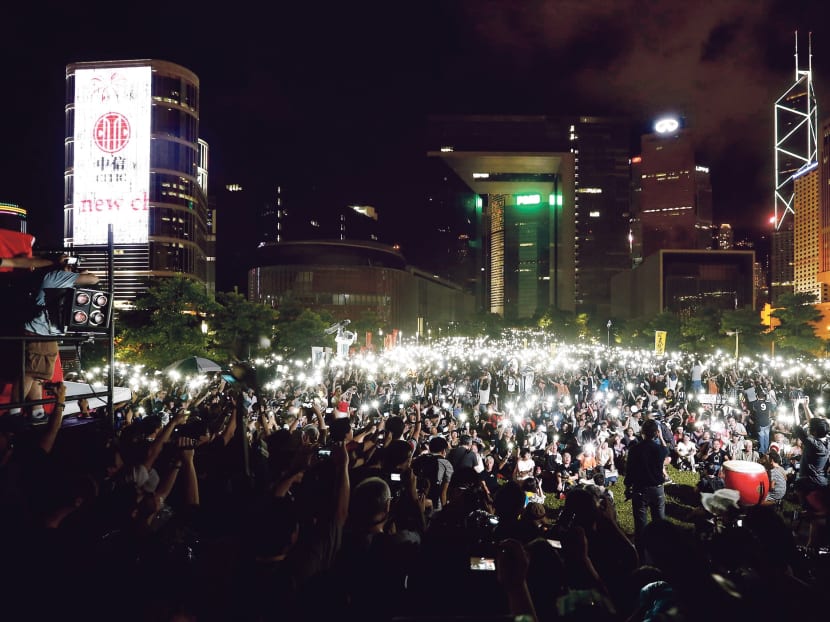Beijing rules out open elections in HK
HONG KONG — China’s legislature laid down strict limits yesterday to proposed voting reforms in Hong Kong, drawing battle lines in what pro-democracy groups warned would be a deepening confrontation over clashing visions of the political future of the city and of China.

Pro-democracy activists switching on their mobile phones in unison during a rally in front of Hong Kong’s financial Central district yesterday. China said candidates for the territory’s next leader must be screened in advance, triggering fury in the city. Photo: Reuters
HONG KONG — China’s legislature laid down strict limits yesterday to proposed voting reforms in Hong Kong, drawing battle lines in what pro-democracy groups warned would be a deepening confrontation over clashing visions of the political future of the city and of China.
Pushing back against months of rallies calling for free, democratic elections in Hong Kong, the National People’s Congress Standing Committee set out procedural barriers for candidates for the city’s top leader that would ensure Beijing remained the gatekeeper to that position and to political power over the city.
Mr Li Fei, a deputy secretary general of the committee, told a news conference in Beijing that the nominating guidelines — including a requirement that candidates “love the country and love Hong Kong” — would “protect the broad stability of Hong Kong now and in the future”.
The move closes one of the few avenues left for gradual political liberalisation in China after a sustained campaign against dissent on the mainland this year under President Xi Jinping. In pressing its offensive in Hong Kong, Beijing has chosen a showdown with a protest movement unlike any it has faced on the mainland. Hong Kong’s opposition forces enjoy civil liberties denied in the rest of China and, capitalising on those freedoms, have taken a more confrontational approach than seen before in Hong Kong.
Hong Kong opposition groups and politicians who have campaigned for unfettered voting for the city’s leader, the Chief Executive, said the limits set by Beijing made a mockery of the “one person, one vote” that had been promised to Hong Kong.
“Hong Kong people are right to feel betrayed. It’s certain now that the central government will be effectively appointing Hong Kong’s Chief Executive,” said Mr Alan Leong, a pro-democracy legislator.
Following the committee’s widely expected decision, pro-democracy supporters rallied in a park in front of Hong Kong government headquarters. The supporters numbered at least 5,000, according to some reports.
“Today is not only the darkest day in the history of Hong Kong’s democratic development, today is also the darkest day of one country, two systems,” said Mr Benny Tai, a law professor and one of Occupy Central’s main leaders, referring to the formula under which capitalist Hong Kong, with a population of around 7.2 million, was returned to Communist Chinese rule in 1997.
Occupy Central, the main group advocating open elections, said it was planning civil disobedience protests in the city’s commercial heart.
“We are very sorry to say that today, all chances of dialogue have been exhausted,” the group said in an emailed statement. “The failure of this constitutional reform has dashed people’s hopes for change and will intensify conflicts in the society.”
Advocates and opponents of political liberalisation alike have seen Hong Kong as a potential incubator for change in China since it was returned to Chinese rule.
The struggle over electoral change pits the Chinese authorities and their allies in Hong Kong against an opposition that claims robust middle-class support, protections by the city’s independent judiciary and a voice in an independent, though beleaguered, news media.
“China’s two most important cities are Beijing and Hong Kong,” Mr Hu Jia, a prominent dissident in Beijing, said by telephone yesterday. He said he had been placed under house arrest, like other dissidents, before the National People’s Congress announcement. “In the territory controlled by the Chinese Communist Party, only Hong Kong has some space for free speech (and) some judicial independence, so it is a mirror for people on the mainland.”
The Chinese government fears direct nominations would allow candidates hostile to Beijing and has said direct nominations would also contravene the Basic Law, the document governing Hong Kong’s relationship with the mainland.
“Each country’s historical, cultural, economic, social and political conditions and circumstances are different, and so the rules formulated for elections naturally also differ,” Mr Li said yesterday.
The Hong Kong government will use the Chinese legislature’s proposal as a framework for an electoral reform Bill. That Bill must then win approval from the city’s 70-member Legislative Council, where the 27 democratic members could still block its passage by the required two-third majority.
Ms Emily Lau, chairperson of Hong Kong’s Democratic Party, said they would. “We will veto this revolting proposal,” she said yesterday.
But Mr Leung Chun-ying, Hong Kong’s pro-Beijing Chief Executive, said killing the Bill would also kill universal suffrage. “We cannot afford a standstill in our constitutional development or else the prosperity or stability of Hong Kong will be at stake,” he said. Agencies





